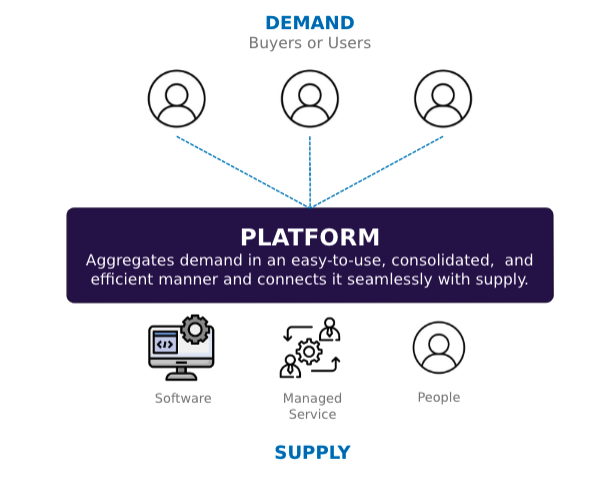When corporate legal leaders consider different legal operations technology solutions, they face a world of bland and similar descriptions for various offerings. A case in point is the use of the term “platform.” The technology platform concept has been trendy for several years, alongside cloud computing and artificial intelligence. While a powerful idea, it, unfortunately, has become a throwaway word as most legal technology vendors use it to describe their loose collection of products that are a mix of organically developed and acquired products.
Firstly, the discussion of a platform does NOT begin with technology. Instead, it is a proven business model technology-based companies repeatedly apply to dominate their markets. Think Amazon, Uber, eBay, Airbnb, and so forth.
A platform approach consolidates demand for a specific consumer need efficiently and connects it seamlessly with supply – retail goods for Amazon, temporary and localized transportation for Uber, and vacation rental properties for Airbnb. The model was initially developed to serve consumer markets but has also been replicated for business marketplaces. For operationally efficient and agile companies and business functions, it has also been applied to address an “internal” market for corporate services.

The Platform Model
Two examples come to mind. First, most corporate IT organizations moved to a platform approach starting a decade ago. For example, an employee needs a new laptop, a developer needs access to a database or virtual server, a marketer needs to add a new SaaS tool, and an executive needs desktop support. Solutions from companies such as Zendesk, Jira, and BMC have enabled the CIO to implement a platform approach to aggregate the internal demand for IT services and efficiently satisfy it with a combination of internal hardware, public cloud services, and IT staff and contractors. Second, leading HR organizations offer a similar model. For example, an employee needs a copy of a paystub, wants to change benefits, or needs to make a vacation request. A manager must initiate and manage an annual review process with her team. A Chief People Officer relies on Workday, Ceridian Dayforce, or SAP SuccessFactors to deliver a platform model to address employees’ needs for HR-related services.
As with other business functions, a platform model does NOT replace the highest value work that the legal department performs that requires deep collaboration and partnership with other business functions, for example, understanding the implications of a pending regulation on a business unit operating model, the development of a new, global chain strategy, or the development of a seamless digital quoting and contracting process for a family of SaaS offerings that is directly accessible by customers. Instead, it creates efficiency for legal and frees the team to focus on these value-add projects. In a previous blog, we shared that ~80% of corporate legal’s time and expense goes towards run rate legal support: contracts, business agreements, IP and trademark requests, legal holds management, real estate agreements, and so forth. A platform model can help reduce this allocation of time and effort so legal can have the bandwidth to focus on making a cross-enterprise impact. Legal leaders have internal references for the model’s effectiveness – their own CIO or Chief People Officer.
In addition to a better internal customer experience, legal leaders gain greater understating and control of their function:
- The visibility to internal demand can feed an internal quarterly legal “report card” and provide the data needed to forecast future demand.
- Central aggregation allows managing all work more efficiently, enabling more self-service of legal requests through a combination of established processes and technology.
- A deeper awareness of the “what and who” of their operations.
- A better ability to balance work done internally versus by outside counsel.
- A greater understanding of outside counsel activity and spending so you can proactively manage outside law firm work.
Back to where we started — given the sameness of how legal technology providers merchandise their “platforms,” what should legal leaders expect when considering a modern technology platform that can support this model? Learn more in our next blog, which outlines the critical elements of a modern platform.






